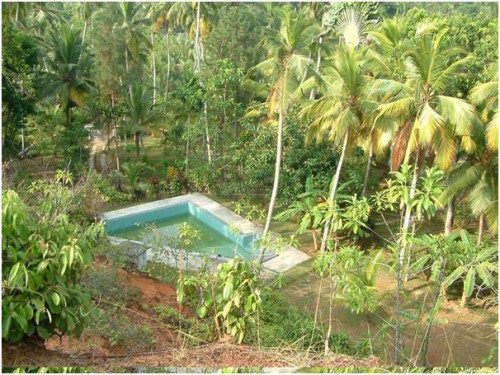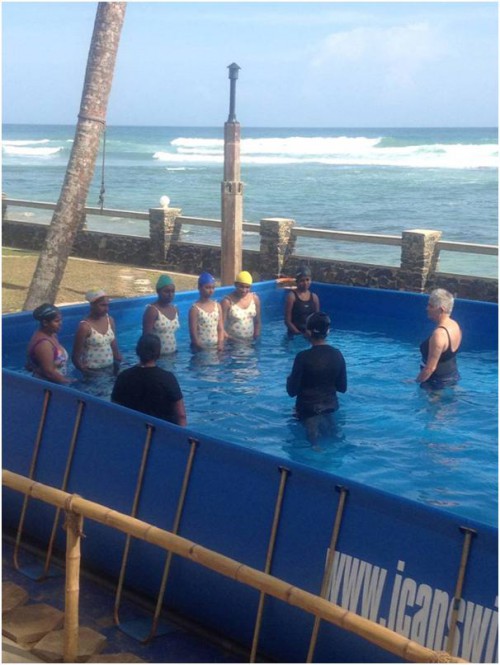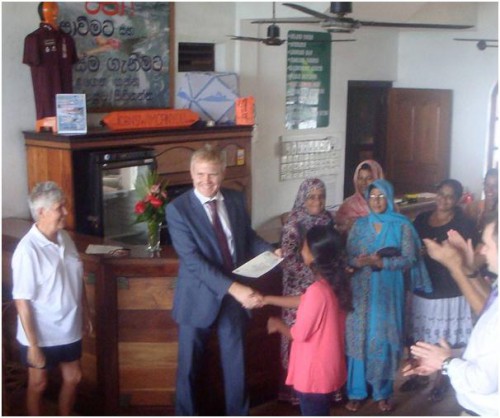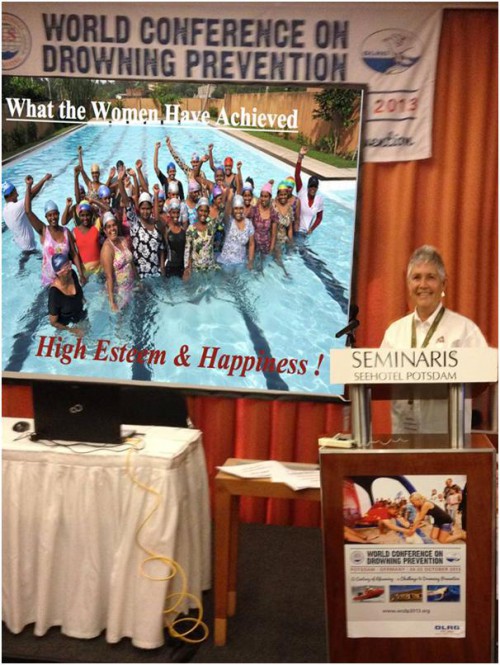18th December 2014 Colombo, Sri Lanka
Ten years of the Sri Lanka Women’s Swimming Project
The second blog in our series describes the work of Christina Fonfé, a British qualified swimming instructor, and her mission to teach the women of Sri Lanka water survival skills.
The Asian Tsunami of 2004 silently drowned a quarter of a million people. In Sri Lanka, over 35,000 people lost their lives. OXFAM reported that 80% of those who drowned in the tsunami in Sri Lanka were women and children. Culturally, women and girls in rural Sri Lanka do not swim, even though the country is an island; they have little experience of entering more than knee-deep water. Up to three people a day drown on the beaches, lakes and rivers of Sri Lanka, more than die of dengue fever.
When Christina first came to Sri Lanka, she gave swimming lessons to children in refugee camps as a life skill, not a luxury. But when she discovered that many women were unfamiliar with swimming, floating and surviving in the water and unable to save their children in an emergency, she founded the Sri Lanka Women’s Swimming Project to teach any girl or women over the age of 13 year how to swim.

The Project began in a derelict coconut plantation pool in Weligama, where the first thousand women learned to swim and the first six qualified as swimming teachers. After two years, the plantation was sold for development and the Project reverted to renting out-of-season villa and hotel pools up and down the South coast between Weligama and Galle, teaching women from the villages around them. To cover the costs, Christina rented out her UK home and leased a villa on Koggala Lake and then beachfront premises in Ahangama.
In 2012, the British High Commission donated a 12-metre portable fabric pool which has given the Project much more flexibility. In parallel, the Project has taught 40 to 60 students at a Women Only Day in the Lighthouse Community Pool in Galle since 2008 and also taught selected villa and hotel staff to swim and carry out pool-side rescues and CPR.

By stepping back a generation from children, the project creates adults who can ensure that their children also learn to swim and supervise them when they do. Teaching focuses on survival and keeping airways open by making the ability to Float-and-Breathe on the back for extended periods the first and instinctive skill to be learned. After that, it is easy to teach the different strokes. Initially, students are taught on a one-to-one basis. They are only considered safe in a swimming pool when they can jump in out of depth, float on their backs for 10 minutes, swim any stroke for 100 metres and then climb out of deep water to safety, unaided and without encouragement, for the award of their icanswimcanyou certificate.
To date, over four thousand women and girls have learned to swim; twelve of those have gone on to become internationally qualified swimming teachers – some abroad and some in Sri Lanka – and three are supporting themselves at university through swimming.

Learning to swim has given these Sri Lankan women safety and knowledge in and around water and empowered them by boosting their self-esteem and confidence and improving their communication skills, mental health and fitness.
The British High Commission will have a Book of Remembrance open for signature from 0900 – 1200 on working days between Monday 22 December and Tuesday 6 January.
#Tsunami10years
Read our First Blog of this series: How will we remember?

I’m nilu from srilanka. i like to learn swimming well. can you support ?
I’m glad you enjoyed the blog. Do look at the icanswimcanyou website to learn more about the project
How do I get started and help more women learn to swim.
So glad you found the Sri Lanka Women’s Swimming Project inspiring – here is the link to their website, if you’d like to contact them and find out more:http://www.icanswimcanyou.com/
I’ve just returned from Kerala, and exploring options of working in Sri Lanka and came across your post. I’m so impressed with your mission and the will to carry out such an important endeavour. I feel humbled by my own thinking that the reason the Indians didn’t go out into deeper water, especially the women, was for descreet/religious reasons not because in all likelihood they couldn’t swim. What wonderful work you are doing, emily